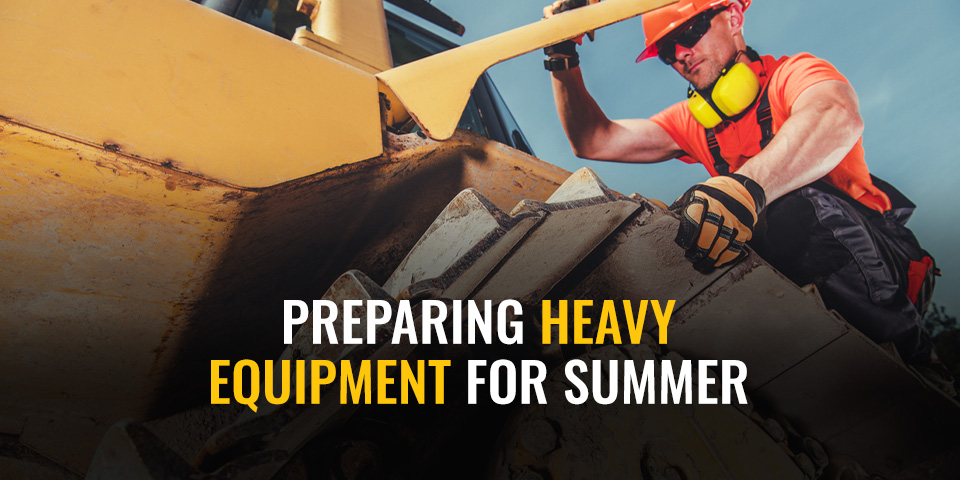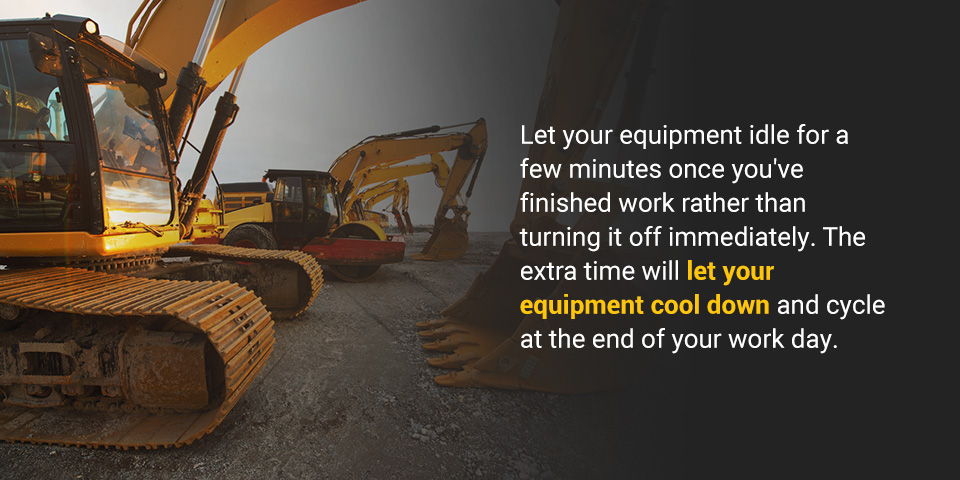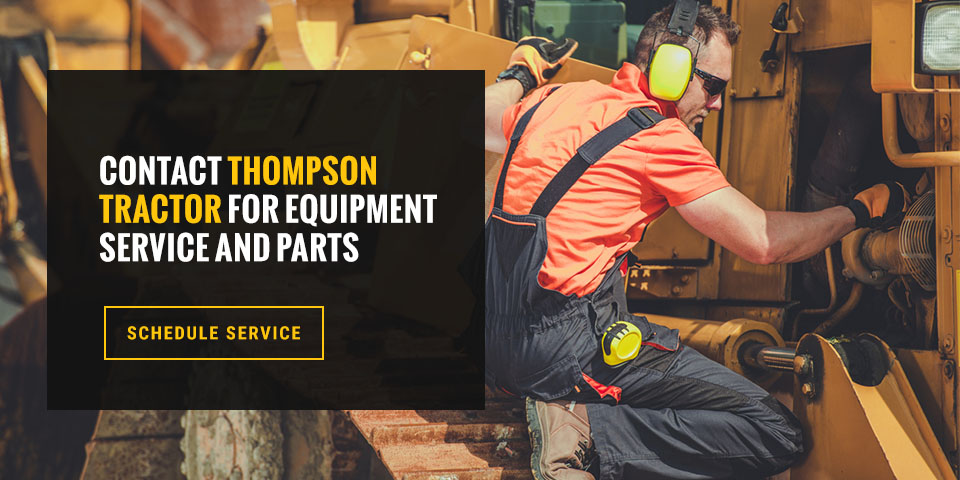Summer can be hard on workers and heavy equipment. Construction work often peaks in the summer, meaning construction equipment is exposed to heat consistently. The heat and humidity can cause strain on your equipment, which can cause damage and unwanted downtime.
Preparing your heavy equipment for the busy summer season can reduce damage and costly repairs. Below are some tips to prepare your summer equipment for increasing temperatures and humidity.
Complete a Wildlife Check
Checking your heavy equipment for wildlife is an essential first step when you’re preparing your construction equipment for summer. Birds and other wildlife may have made your equipment their home during winter or spring, and their nests can get into different holes or components of machinery. These nests can start a fire if not removed, becoming a safety hazard for operators and damaging your equipment. If you miss a nest in the spring, it can dry out by summer, making it more likely to start a fire.
While engine cleaning is necessary according to manufacturers’ manuals, you may need to use special cleaning intervals to remove these nests. Always check the equipment you haven’t used throughout winter and spring. You may also want to check your equipment even if you have operated them a few times in the off-season since birds can make nests quickly. Removing these nests also eliminates the risk of any wildlife coming to harm on your worksite.
Ensure Proper A/C Operation
Air conditioning is crucial in hot summers, especially when working outside and operating heavy equipment. First, service your heavy equipment’s A/C prior to starting work in the summer season. A malfunctioning A/C can make it easier for operators to overheat, which can result in significant injuries and illnesses, such as heat stroke. Service your A/C before you start working on projects, whether you perform the service in-house or outsource it to a professional. You should also test the A/C once you’ve finished the service.
Once you’re sure your A/C works, ensure you’re not putting any unnecessary stress on the A/C system. Leaving windows or doors open while operating the equipment’s A/C can put unnecessary stress on the system, making it work harder to cool a space. An overloaded A/C needs frequent maintenance, and the system could break down, requiring expensive repairs or a replacement.
During the summer, monitor your cab intake and A/C filters to keep them clean to reduce stress on the A/C system. Operators should limit how often they run the equipment’s A/C when the doors or windows are open to reduce the dust that enters these filters. Some heavy equipment dealers offer software parameters that limit the A/C fan speed if the doors are open, which can maintain your system’s performance.
Regular Fluid Checks
Check your fluid levels before you start work in the summer, including coolant, oil and other fluids. Topping off these fluids ensures your equipment will continue to operate correctly. Checking your fluid levels before you start working ensures there are no leaks or contamination.
Once you’ve started work, you’ll need to check your daily fluid levels. Heavy equipment works hard throughout the summer, and different fluids can become increasingly hot. Summer is also more humid in many places, and hot fluids can draw in moisture. Even small amounts of water mixed into different fluids, especially gas or diesel, can cause maintenance problems and performance issues. These challenges will result in more codes or alerts, forcing you to drain fuel or fluids more often. Topping off fluids daily can prevent unwanted moisture from infiltrating your fluids.
Allow for Adequate Cool-Down Time
Working in hot environments can strain equipment, so give heavy machinery plenty of time to cool down. Let your equipment idle for a few minutes once you’ve finished work rather than turning it off immediately. The extra time will let your equipment cool down and cycle at the end of your work day.
The turbocharger is one of the most essential components in heavy equipment. These components use oil for lubricant and rotate at high rotations per minute (RPM). The standard for turbochargers is a two-minute idle time before the equipment is shut off. During the summer, turbochargers may have a higher engine load, which could drastically increase their RPMs. If the turbocharger isn’t allowed to cool down, the component can become damaged. Other components of heavy equipment also need plenty of time to cool before the equipment is turned off.
Continue Regular Construction Equipment Maintenance Through the Summer Heat
Any maintenance you perform throughout the year should also be performed during the summer to improve equipment efficiency. Maintenance includes daily inspections and scheduled maintenance at predetermined intervals. Daily inspections or maintenance for summer should include:
- Using thicker grease: Hot temperatures can decrease grease’s adhesive properties. Use thicker grease to ensure it maintains its adhesive properties within your equipment. Your manufacturer’s manual should tell you what grease is best for your equipment. Heavy equipment usage throughout summer can cause grease to “squeeze out,” so check your lubrication regularly. You should also clean equipment regularly to reduce the damage that occurs when grease mixes with dust or silt.
- Checking belts or hoses: Visually inspect belts and hoses to look for looseness or discoloration since these can be signs of overheating.
- Checking tire pressure: Tires are essential for many types of heavy equipment and can make machinery inoperable if tire pressure gets too low or the tire blows. Check tire pressure daily and visually inspect tires for worn tread or damage.
- Checking brakes: Brakes keep your workers safe and ensure they can come to a stop when necessary. Hot summers can reduce brake friction, so check equipment brakes regularly to keep your work environment safe.
- Maintaining the cooling system: Summer conditions require maximum airflow through the oil cooler. Check the cooling system to ensure it’s free of debris so it doesn’t become clogged.
Scheduled maintenance goes deeper than daily inspections and ensures all components of your equipment work properly. It can involve technical monitoring, oil analysis, cleanings and other routine tasks that keep your equipment in optimal condition.
Contact Thompson Tractor for Equipment Service and Parts
Preparing your equipment for summer involves performing service and maintenance to ensure your equipment is performing at peak efficiency. You’ll also want to replace parts that aren’t working properly to keep your workers safe and boost your efficiency during the busy summer. Thompson Tractor stocks new and used parts consistently, giving you access to the components you need when you need them.
We can also perform preventive maintenance and service on your machinery to keep it running so you can complete projects on schedule. Schedule a service appointment with us today to get ready for the summer!




